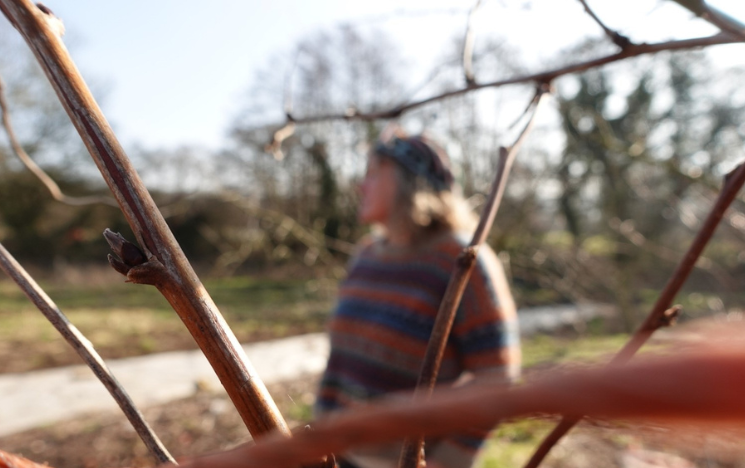About
Women Back to the Land follows women's journeys into land-based work.
Women from urban backgrounds are heading 'back to the land' in contemporary Britain. These women – who are neither 'landed’, nor from farming families – are breaking the mould by making their living from land-based work. From shepherds to foresters, smallholders to market gardeners, many of them are also gathering under an emerging movement for social and ecological justice that puts food, farming, and land at the heart of its campaign - and women at its helm.

A participant of 'Women Back to the Land' photographed on her farm.
Participants
The study focuses on individuals who are actively engaged in growing food, fuel and fibre for human consumption (e.g. as farmers and growers) in two British regions – Sussex, England, and Powys, mid-Wales. The project centres the experiences of women who are not from landowning or landworking backgrounds, but who have made a conscious decision to pursue a livelihood on the land. The project is conscious of gender diversity and is open to participation by any individuals who can relate their personal experiences to this subject.
Approach
The research follows a small cohort of women on their journeys into and through landwork over a period of one to four years. A range of methods are used throughout to generate and interpret data, and create research outputs in ways that can engage and inspire others, including:
- participant observation - the researcher participates in land-based work and activism, observing others and considering her own involvement
- expert interviews - people with specific knowledge and expertise are interviewed to provide insight into the cultural landscape through which women are making their journeys
- psychosocial life-history style interviews - women are interviewed at different points on their journeys to explore them in detail and see how they change
- visual methods - hand-drawn graphics and videos are used to support with the interpretation and communication of research findings
- collaborative workshops - participants and other stakeholders are brought together to help shape research outputs.
Researcher
The project is led by Dr Rachael Durrant, Leverhulme Early Career Fellow based at the Science Policy Research Unit (SPRU), University of Sussex Business School, where she has held an academic post as a Research Fellow since 2014 (prior to this, Rachael studied her PhD at SPRU). Throughout this time her focus has been on designing and carrying out activist research for sustainability, to inform policy and practice in the UK and Europe.
Academic advisors for this project have included Dr Adrian Ely, Dr Elaine Swan, Professor Andy Stirling, Professor Fiona Marshall, and Professor Rachel Thomson.